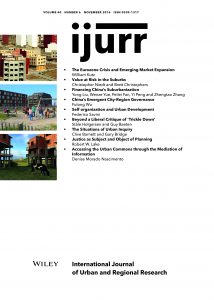Several US counties and local governments have recently considered a novel solution to the foreclosure crisis. They plan to use eminent domain to compel the owners of mortgage debt—and specifically of private-label mortgage-backed securities—to sell the debt to the government at a price reflecting the loan’s market value. The government would then restructure the debt and resell it to new investors. The plans are striking because—in contrast to both development-driven eminent domain and the federal subprime bank bailout—they would force investors to assume asset devaluation and increased long-term risk. Notably, the plans have emerged as an instance of financialization-focused politics in suburbs and suburban cities of color, specifically majority-black and -Latino/a suburbs. Local support for the plans, we argue, is rooted in the long-term disinvestment of these ‘suburbs of exception’, which became targets of subprime lending and eventually sites where the ‘financial exception’ has been localized. But these demographic shifts, fragmentation and fiscal pressures have at the same time created a suburban political terrain in which the plans have gained their strongest political support.
Details
Written by:
Christopher Niedt & Brett Christophers
Digital Object Identifier (DOI)
10.1111/1468-2427.12413
About DOI

